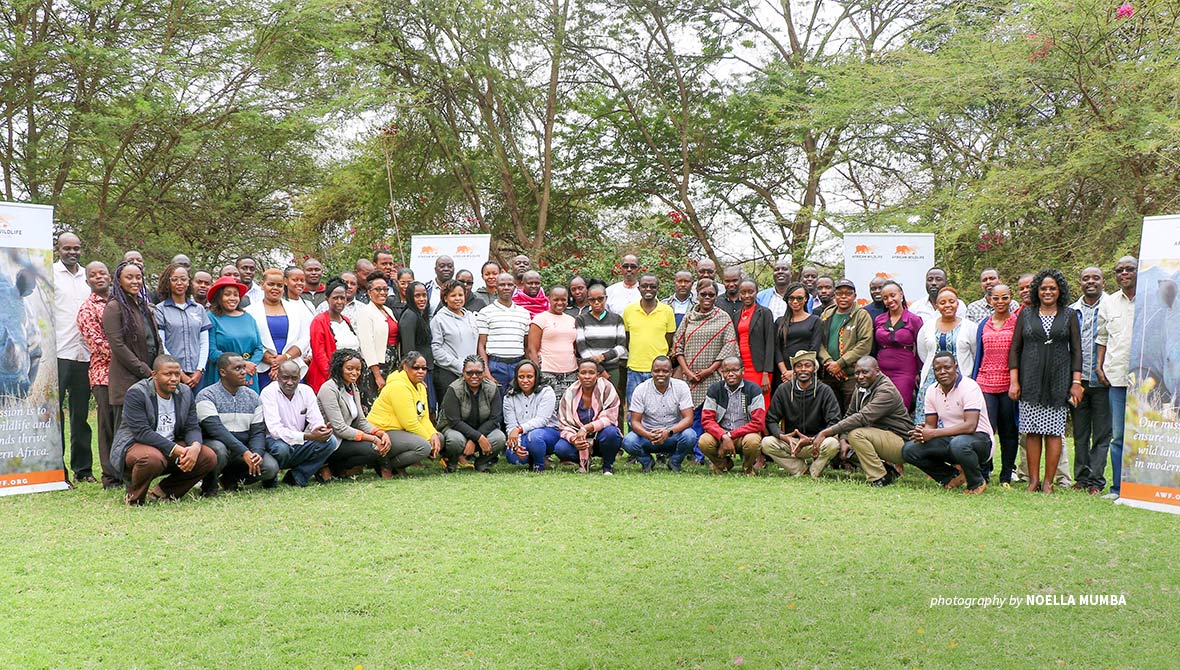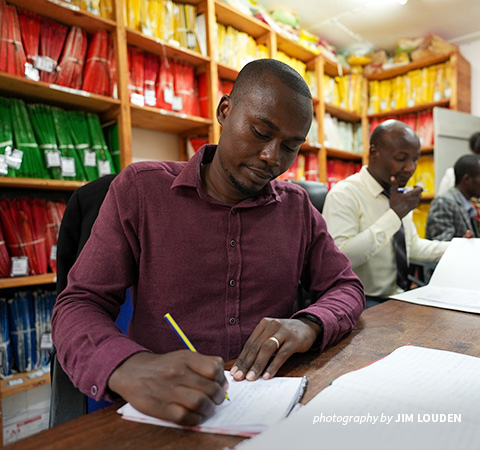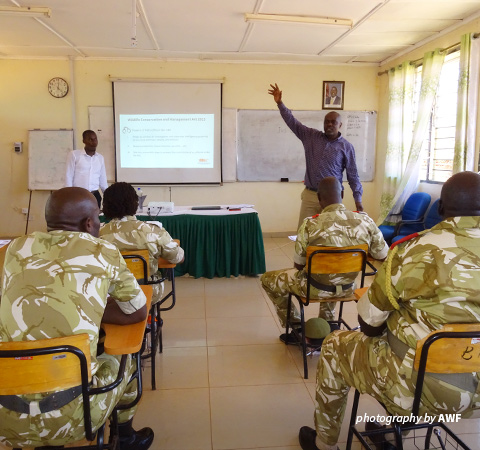Multisector collaboration strengthens the fight against wildlife crimes

Across the globe, the status and future of natural resources continue to draw urgent attention due to the evolving challenges surrounding their management. While African governments make legislation and policies to strengthen natural resource management, illegal wildlife trafficking remains a major threat to biodiversity.
In Kenya’s Tsavo landscape, African Wildlife Foundation’s (AWF) Counter Wildlife Trafficking program is tailored to engage with prosecutors, the judiciary, and investigators. This involves tracking wildlife crime cases in the various courts of law within the landscape while engaging these actors through the Wildlife Judicial and Prosecutorial Assistance Training Series. The program bridges gaps these law enforcers may encounter during the criminal trial process of wildlife cases.
According to internal court data gathered by AWF’s Legal Officer, Counter Wildlife Trafficking Benson Kasyoki — who oversees the court monitoring program in the Tsavo landscape — the trainings have increased investigation activities that resulted in the prosecution of 1,761 wildlife offenders. Additionally, the conclusion rate increased in 2022 to 55.1 percent against 2021’s 51.3 percent, and the conviction rate of 97.1 percent in 2022 also rose from 95.4 percent in 2021.

Benson Kasyoki, AWF Legal Officer, Counter Wildlife Trafficking, monitors wildlife crime cases in the Tsavo landscape
“Last year, in the spirit of fostering a multi-agency approach in combating illegal wildlife trade, AWF stretched its Wildlife Judicial and Prosecutorial Assistance Training Series tentacles to other key stakeholders in the criminal justice system, such as probationers,” said Kasyoki.
Through the Probation & Aftercare Service within the State Department for Correctional Services, probationers play a central role in the bail and bond process, sentencing, and the supervision of community service orders and probation sentences as provided in the Probation of Offenders Act Chapter 64 and Community Service Order Act. In Kenya today, many wildlife offenses are still perceived as ‘petty crimes.’ Upon conviction by courts, most offenders are given non-custodial sentences that fall under the probationers’ mandate.
At the height of the COVID-19 pandemic, governments were forced to decongest prisons as they were viewed as hotspot zones for the spread of the virus. Through the Rapid Results Initiative, the Probation & Aftercare Service and Kenya Prisons Service launched a decongestion exercise in 2020, targeting 10,000 prisoners. Many wildlife crime offenders were released from prison under this government directive posing a significant challenge for wildlife law enforcement in Kenya.
On February 19, 2022, AWF facilitated a wildlife crime sensitization workshop at Voi Wildlife Lodge for probationers and Kenya Wildlife Service (KWS) officers drawn from the Tsavo Conservation Area. The workshop was designed to enhance synergy between both agencies and better grasp the mandates and functionalities of each with an overall goal of working hand in hand in combating illegal wildlife activities in the region. “This workshop is, therefore, of immense benefit as it will help bring leverage to the probation officers on wildlife crimes, shedding more light to the general understanding of wildlife offenses and establishing a liaison point with the Kenya Wildlife Service,” notes Probation Officer Justus Nyaga.
From August 26-28, 2022, AWF facilitated the Cross-Sectoral Judicial Symposium, offering a shared space for various actors to hold candid discussions on investigating, prosecuting, and adjudicating wildlife crime cases. With KWS investigators and prosecutors taking the lead, prosecutors and magistrates from Amboseli and Tsavo ecosystems exchanged ideas deeply on matters concerning illegal wildlife trade. At the same time, the issue of children being implicated in wildlife crimes raised great concern among stakeholders as this violates children’s rights as they are exposed to hazardous conditions in the protected areas. This calls for further engagement with other government agencies on the same. Agencies present agreed to positively address issues from their end and cooperate in the fight against wildlife crime.
Digital and electronic evidence sensitization workshops
Additionally, AWF held two sensitization workshops themed ‘Digital and Electronic Evidence Sensitization Workshop’ at the Kenya Wildlife Service Law Enforcement Academy in Manyani. The two workshops targeted 132 KWS officials undergoing a ranger to corporal promotion course and 32 officers undergoing upskilling on the dynamics of wildlife crimes. As wildlife cybercrime perpetrators embrace digital tools and platforms such as mobile phones and social media platforms as conduits for these crimes, the first workshop on June 3, 2022 focused on capacity-building these officers to respond to wildlife crime scenes containing digital and electronic evidence.

AWF regularly trains KWS rangers in wildlife cybercrime at the KWS Law Enforcement Academy in Manyani
Two modules, Managing Wildlife Cybercrime Scenes and Actions at the Wildlife Cybercrime Scene and Evidence Management, were tailored to expose trainees to principles of digital evidence, as well as identification, collection, and documentation of digital evidence. In addition, skills in crime scene processing, packaging, transportation, and digital evidence storage were imparted. As AWF’s Manager, Cybercrime Investigations Ernest Agina notes, “The security of a law enforcement officer is fundamental in any kind of crime scene. A digital crime scene is no exception.”
At another workshop on November 4, 2022, KWS officers held comprehensive discussions on the Law of Digital Evidence, a case of Kenya’s cybercrime regime. For example, The Computer Misuse and Cybercrime Act provides for clearly defined roles of law enforcement officers and the investigation procedures of cybercrime offenses. While the Wildlife Conservation and Management Act 2013 offers stiffer penalties for wildlife offenses, this is not true for other legislations guiding natural resource management in Kenya. Hence, Florence Magoma, KWS Senior Prosecutor, delved deeper into Kenya’s wildlife, forestry, and fisheries offenses.
As the fight against illegal wildlife activities across Africa continues, AWF remains committed to increasing conservation knowledge across different conversation partners engaged.
> Learn how AWF trained KWS rangers on DNA forensics in wildlife crime cases